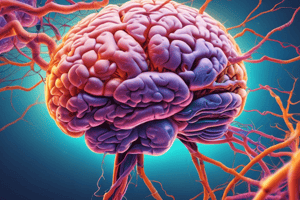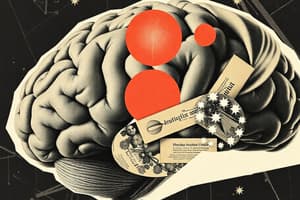Podcast
Questions and Answers
A patient is experiencing tremors, rigidity, and difficulty initiating movement. Which neurotransmitter imbalance is MOST likely contributing to these symptoms?
A patient is experiencing tremors, rigidity, and difficulty initiating movement. Which neurotransmitter imbalance is MOST likely contributing to these symptoms?
- Serotonin overabundance
- Acetylcholine deficit
- Dopamine deficit (correct)
- GABA overabundance
Increased levels of glutamate are likely to reduce the risk of migraines and seizures.
Increased levels of glutamate are likely to reduce the risk of migraines and seizures.
False (B)
A researcher is studying a new drug that reduces pain perception. Which neurotransmitter is the drug MOST likely affecting, either directly or indirectly?
A researcher is studying a new drug that reduces pain perception. Which neurotransmitter is the drug MOST likely affecting, either directly or indirectly?
Substance P or Endorphins
A deficiency in the neurotransmitter _________ is often associated with clinical depression, impacting mood control.
A deficiency in the neurotransmitter _________ is often associated with clinical depression, impacting mood control.
Match each neurotransmitter with its primary function:
Match each neurotransmitter with its primary function:
Flashcards
Dopamine
Dopamine
Affects motor movement, alertness, and reward pathways. Imbalances are linked to Parkinson's and Schizophrenia.
Serotonin
Serotonin
Regulates mood. Low levels are linked to depression.
Norepinephrine
Norepinephrine
Deals with alertness and arousal. Deficits can result in depression.
Glutamate
Glutamate
Signup and view all the flashcards
GABA
GABA
Signup and view all the flashcards
Study Notes
- Neurotransmitters affect several functions in the human body, and excesses or deficits can cause diseases.
Dopamine
- Dopamine affects motor movement and alertness
- Lack of dopamine is associated with Parkinson's disease
- An overabundance of dopamine is associated with schizophrenia
Serotonin
- Serotonin affects mood control
- Lack of serotonin is associated with clinical depression
Norepinephrine
- Norepinephrine affects alertness and arousal
- Lack of norepinephrine is associated with depression
Glutamate
- Glutamate is an excitatory neurotransmitter involved in memory
- Glutamate triggers migraines and seizures
GABA
- GABA is an important inhibitory neurotransmitter
- GABA internalizes when having seizures and can cause sleep problems
Endorphins
- Endorphins affect pain control
- Endorphins are involved in addictions
Substance P
- Substance P affects pain perception
- Lack of substance P may be associated with a lack of pain perception
Acetylcholine
- Acetylcholine affects motor movement
- Lack of acetylcholine is associated with Alzheimer's disease
- Acetylcholine is also involved in Myasthenia gravis, a condition that causes muscle weakness
Studying That Suits You
Use AI to generate personalized quizzes and flashcards to suit your learning preferences.
Related Documents
Description
This content explores the role of neurotransmitters in the human body. It discusses how neurotransmitters like dopamine, serotonin, and norepinephrine affect various functions, including movement, mood, and alertness. It also highlights the connection between neurotransmitter imbalances and diseases such as Parkinson's and depression.




